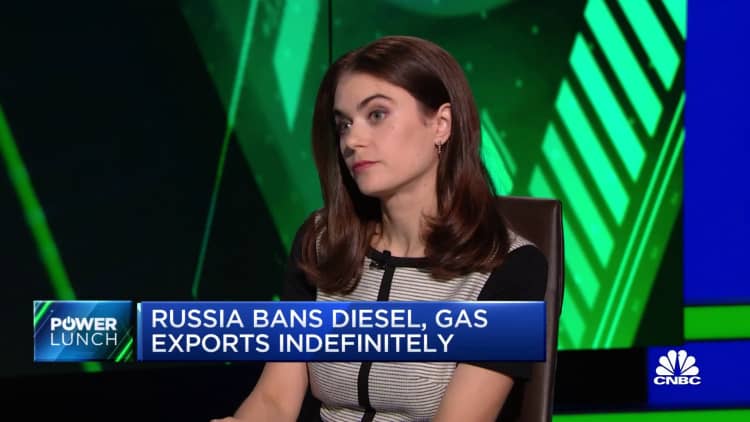From February 5, 2023, the European Union will cease the purchase of petroleum products like diesel, gasoline, and lubricants from Russia.
Picture Alliance | Picture Alliance | Getty Images
Russia has implemented an indefinite ban on the export of diesel and gasoline to most nations. This move poses a threat to fuel supplies before winter, potentially worsening global shortages.
In a government decree signed by Prime Minister Mikhail Mishustin, the Kremlin stated on Thursday that it would impose “temporary” restrictions on diesel exports to stabilize fuel prices in the domestic market.
The ban, effective immediately, applies to all countries except four former Soviet states. The exempted countries include Belarus, Kazakhstan, Armenia, and Kyrgyzstan, all of which are members of the Moscow-led Eurasian Economic Union.
Russia is one of the largest diesel suppliers globally and a significant exporter of crude oil. Concerns arise among market participants regarding the potential impact of this ban, especially when global diesel inventories are already at low levels. Oil prices reacted to the news, with a $1 per barrel increase before settling lower for the session.
On Friday afternoon in London, international benchmark Brent crude futures traded 0.9% higher at $94.13 a barrel, while U.S. West Texas Intermediate futures rose 1.1% to $90.62.
Energy analysts find Russia’s announcement vague, making it difficult to determine how long the ban will remain in place. They warn that Moscow may once again be using fuel supplies as a weapon leading into another winter heating season.
According to Reuters, a spokesperson for the Kremlin reported that the fuel export ban would last for as long as needed to ensure market stability.

Leading up to Thursday’s intervention, Russian diesel exports faced pressure due to the weakness of the ruble, domestic refinery maintenance, and efforts to enhance domestic supply, according to analysts.
Victor Katona, lead analyst at Kpler, mentioned in a research note published on Friday that all agreements made before the regulatory action took effect would continue. He added that the impact on diesel and gasoline exports would likely be delayed by 1-2 weeks.
He also warned that the government could cancel the legislation without warning, similar to how it was introduced.
What could be the effects of the ban?
Prior to the Kremlin’s full-scale invasion of Ukraine in February last year, Russian refineries exported around 2.8 million barrels per day of oil products. ING estimates that this number has now dropped to approximately 1 million barrels per day. However, Russia remains a significant player in global energy markets.
According to Warren Patterson, head of commodities strategy at ING, Russia’s ban on fuel exports is a significant development before the winter season in the Northern Hemisphere, which typically sees an increase in demand.
“The middle distillate market was already experiencing considerable strength prior to this ban, with tight inventories in the US, Europe, and Asia as we approach the Northern Hemisphere winter,” said Patterson. He cited factors such as OPEC+ production cuts, recovering air travel, and Europe’s struggle to replace Russian middle distillates after a ban was imposed in February.
“The loss of around 1 million barrels per day of Russian diesel in the global market will be felt and further supports our positive stance on middle distillate cracks and refinery margins. The extent of the impact depends on the duration of the ban,” he added.
Oil storage tanks in Tuapse, Russia, March 22, 2020.
Bloomberg | Bloomberg | Getty Images
OPEC leader Saudi Arabia announced on September 5 that it would prolong its 1 million barrel per day production cut until the end of the year. Non-OPEC leader Russia committed to reducing oil exports by 300,000 barrels per day for the same period. Both countries plan to review their voluntary cuts monthly.
“The ban appears to address tightness and high prices in the domestic Russian markets, which are likely painful for Russian consumers given the high oil prices combined with a weakened ruble,” said Callum Macpherson, head of commodities at Investec. “However, there are similarities to disruptions in Russian gas supplies to Europe that began as supposedly temporary disruptions while gas was held back for domestic storage – we all know what happened there.”
“It may be a coincidence that this ban was announced the day after Russia faced difficulties at the UN, or it could be an extension of using energy as a weapon in response.”
Denial of responsibility! Vigour Times is an automatic aggregator of Global media. In each content, the hyperlink to the primary source is specified. All trademarks belong to their rightful owners, and all materials to their authors. For any complaint, please reach us at – [email protected]. We will take necessary action within 24 hours.


